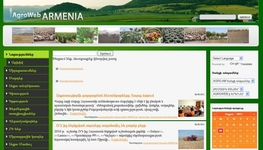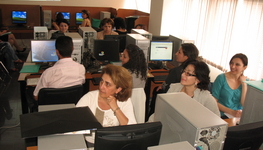05/15/11
VERCON: ICT Strengthening Agricultural Research and Extension in Armenia
 Over the past decades, the idea of harnessing the skyrocketing potential of information and communication technologies (ICT) to fuel the most development-oriented areas of human activities, such as research and education, has become increasingly dominant throughout the world. In Armenia, the joint efforts of the Government and the Food and Agriculture Organization (FAO) of the United Nations have resulted in the establishment of AGRO.AM Network (www.agro.am) – a nationwide web platform for communication and exchange of information and data between the leading national agricultural research and extension institutions and professionals. Armenia is now a successful example of having up-to-date information and communication technologies effectively serving professional needs of research, education and extension communities, thus contributing also to agriculture and rural development in the country.
Over the past decades, the idea of harnessing the skyrocketing potential of information and communication technologies (ICT) to fuel the most development-oriented areas of human activities, such as research and education, has become increasingly dominant throughout the world. In Armenia, the joint efforts of the Government and the Food and Agriculture Organization (FAO) of the United Nations have resulted in the establishment of AGRO.AM Network (www.agro.am) – a nationwide web platform for communication and exchange of information and data between the leading national agricultural research and extension institutions and professionals. Armenia is now a successful example of having up-to-date information and communication technologies effectively serving professional needs of research, education and extension communities, thus contributing also to agriculture and rural development in the country.

In 2009, to support the initiative of the Government of Armenia aimed at improving the agricultural advisory services provided to farmers, FAO in collaboration with the Ministry of Agriculture of the RA, launched the Project for Establishment of a Virtual Extension and Research Information and Communication Network (VERCON) in Armenia. Under the project, it was intended to create a common web-based information sharing and communication platform for Armenian research and advisory institutions equipping them with efficient networking tools and capacities to help improve quality of the advisory services provided to farmers.
FAO contributed its broad and valuable experience and expertise in the development of the AgroWeb International Network for Central and Eastern Europe (http://www.agrowebcee.net), Armenia has participated in since early 2000s, and VERCON (Virtual Extension and Research Communication Network) conceptual model (http://km.fao.org/vercon/), successfully adopted by several countries having VERCON as a conceptual pivot for their national agricultural research and extension communication networks.
To effectively meet communication needs of the end-users, AGRO.AM has been designed and developed in consultation with the user community represented by key agricultural research, extension and education institutions in Armenia.
According to the Director of the Shirak Agriculture Support Marz Center Mr. Jivan Aslanyan, the above approach resulted in the institutions successfully using new technology.
- Thanks to the FAO VERCON project, since October 2010 the Agriculture Support Center in Shirak region runs its own website. From the very outset, we have been doing our best to populate the website with content farmers and agricultural processors are most interested in, - says Mr. Aslanyan. Local and regional news, communities’ profiles, publications on effective farm management, farming technologies, crop production techniques, harvesting, and post-harvest crop management, along with an electronic billboard to advertise products and services for sale attract 150-200 unique visitors daily. On behalf of our staff and farmers, I thank the project team for successful collaboration and good job they did. I’m hopeful that this initiative will get proper follow-up.

As one of the most evident signs of success, the Armenian and international professionals involved in the development of AGRO.AM Network as well as the user community point out that the scope of the FAO project initially aimed to establish a pilot network of five institutions (the Agriculture Support Republican (National) Center, Agriculture Support Marz (Local) Centers in Ararat and Shirak regions, Research Center of Vegetable, Melon and Industrial Crops, and the Armenian State Agrarian University), but it has been expanded in the course of the implementation to include all Agriculture Support Centers offering advisory and information services to farmers and agricultural producers in ten provinces (marzes) of Armenia.
Technically supported and coordinated by the Agriculture Support Republican Center, currently the network consists of 13 institutional websites linked together under the umbrella of a common national-level AGRO.AM platform. Eleven Agriculture Support Centers under the Ministry of Agriculture, as well as the State Agrarian University of Armenia and the Research Center of Vegetable, Melon and Industrial Crops are involved in the network, which allows them sharing news, electronic publications, advisory and educational materials and resources, research data and other information on the web.
- We have built a multifunctional network that connects existing resources and creates new capacity for the research and extension institutions in Armenia to effectively fulfill their tasks and meet the needs of their client communities – says Mr. Mkrtich Muradyan, the Director of the Agriculture Support Republican Center. ASRC has been involved in the project as a key project implementation agency leading the process of developing network and building strong partnership between the member institutions. Now we continue to provide necessary technical support and advice to the member organizations and are keen to take the network forward in terms of both involving more members and developing more functionality.
It is noteworthy that AGRO.AM platform serves not only as a web-umbrella for the member institutions but also as a gateway leading the Armenian professionals to the international agricultural community. What actually makes it a “gateway” to international web community and resources is that AGRO.AM platform is integrated into the FAO-supported AgroWeb International Network for Central and Eastern Europe and serves as a national-language version of the AgroWeb-Armenia English-language portal (www.agrowebcee.net/awam).
As part of the AgroWeb Network, AGRO.AM provides direct one-click access to the national agricultural web portals of 29 Eastern and Central European and post-soviet countries participating in the AgroWeb initiative. In addition, through AgroWeb Armenian professionals gain easy access to a number of agricultural thematic networks (APRICOT Network, CENTAUR Veterinarian Network, NACEE Network of Aquaculture Centers, etc.) incorporated within the FAO-supported European System of Cooperative Research Networks in Agriculture (ESCORENA, http://www.escorena.net).
All participating institutional websites within the AGRO.AM Network share the same technology, architecture, design and functionalities. This allows timely and effective information, data and knowledge sharing between the member institutions and their stakeholders. In addition, it helps build a professional community of web-editors and information management specialists working at the leading agricultural institutions of Armenia, which is also considered to be one of the most valuable and promising achievements.
To support this process, a number of workshops, training sessions and face-to-face trainings and consultations on information literacy and web content management have been provided to the representatives of the stakeholder institutions by the FAO professionals, international and national consultants.
I’m sure that in the course of time the number of users and stakeholders will significantly increase, - says Mr. Ashot Voskanyan, the Project National Coordinator. This network has all potential to become the main source of information and knowledge not only for researchers, educators, decision-makers, and agricultural businesses, but also for farmers, who are the key stakeholder. Development of information society with proper involvement of rural areas is of high social and economic importance. Thus, investing money and other resources in this kind of project will be repaid with time.
Submitted by: Nara Yaralyan
Project: ASRC of the MoA/FAO VERCON, 2011
